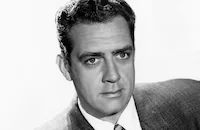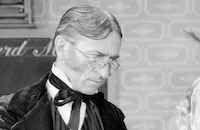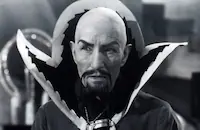Station West

Brief Synopsis
Cast & Crew
Sidney Lanfield
Dick Powell
Jane Greer
Agnes Moorehead
Burl Ives
Tom Powers
Film Details
Technical Specs

Synopsis
In 1881, in a western saloon, a tough-talking stranger named John Martin Haven picks a fight with army lieutenant Stellman. Haven is then escorted by Stellman to a secret meeting with Captain George Iles, the commander of a nearby army post. Haven is a demoted lieutenant who has been sent by the government to investigate a series of deadly gold shipment thefts. He tells the doubting Iles that he will continue to work undercover to discover the thieves's identity and will report his findings to widow Mrs. Mary Caslon, a trusted gold mine owner. To that end, Haven returns to the saloon to speak to the town's financial boss, whom he knows only as "Charlie." While making his inquiries, Haven is distracted by the singing of a beautiful woman and attempts to flirt with her, unaware that she is Charlie. Unmoved by Haven, Charlie encourages Mick Marion, the saloon's bouncer, to fight with him. After a long, bloody fight, Haven beats the previously undefeated Mick and wins Charlie's respect. In his hotel room that night, Charlie gently tends to Haven's wounds and later offers him a job working on one of her many operations. Haven chooses a position on Charlie's stage line and, after reporting for duty, asks Mrs. Caslon to allow him to transport some of her gold. As Haven and fellow driver James Goddard are driving the gold-ladden stage, they are attacked by masked bandits. During the confrontation, Goddard is killed, while Haven is knocked unconscious. When Haven awakens, he discovers a card on Goddard identifying him as a Wells Fargo detective. Haven then pursues Joe, one of the bandits, and shoots and kills him. Finding nothing on Joe's body, Haven follows Joe's horse to Charlie's saw mill, which is being used as the bandits' hideout. There Haven commandeers a wagon from another stage driver and finds a button from an army uniform on the wagon's floor. After he convinces Pete, the bandit leader, that he is just a driver, Haven leaves the mill with a locked box. On the road back to town, Haven breaks open the box and discovers Mrs. Caslon's stolen gold inside. Haven dumps the box into a ravine and returns to town, where he forces Charlie's weak-willed lawyer, Mark Bristow, to notarize a statement concerning his recent activities. Haven then has Bristow give the sealed statement to Mrs. Caslon for safekeeping, but she and Iles read the statement and replace it with blank paper. Soon after, Haven approaches Charlie and Prince, Charlie's partner, and offers to retrieve the gold for a part of its worth. Charlie accepts Haven's offer and admits that she is falling in love with him. When Haven returns to the ravine the next day, he is held up by Mrs. Caslon, who reclaims her gold. At the saloon, Haven reports the loss to Charlie and Prince, who then conclude that Haven and Bristow, who is heavily in debt to Charlie, are planning to blackmail them. Charlie orders Bristow to kill Haven, but Haven convinces the terrified lawyer that Charlie intends to murder both of them. As Bristow attempts to flee town, Mick and Prince shoot him in the back, and Haven sneaks back to the saw mill. After overwhelming a guard and searching the mill, Haven sets fire to a building to create a distraction, then kills Mick. At Mrs. Caslon's, Haven tells Iles that Charlie planted false reports concerning Indian uprisings in order to draw troops away from the fort, where much of Mrs. Caslon's gold is being kept. Haven adds that Charlie intends to steal the gold by having her men pose as soldiers while wearing pilfered army uniforms. Finally trusting Haven, Iles leaves to apprehend the bandits, while Haven goes to town to arrest Charlie. After Charlie offers him a bribe, Haven outdraws Prince during an ambush attempt. Charlie is fatally wounded by Prince's bullet, and as she lays dying, Haven grants her final request by declaring his love for her.

Director
Sidney Lanfield
Cast

Dick Powell

Jane Greer

Agnes Moorehead

Burl Ives

Tom Powers

Gordon Oliver

Steve Brodie

Guinn "big Boy" Williams

Raymond Burr

Regis Toomey

Olin Howlin
John Berkes
Michael Steele

Dan White
John Kellogg

John Doucette

Charles Middleton
Suzi Crandall
Al Hill
Jack Stoney
Stanley Blystone
Joey Ray
Marie Thomas
Robert Gates
Robert Jefferson
Erville Alderson
William Phipps
Leo Mcmahon
Bud Osborne
Ethan Laidlaw
Monte Montague
Lomax Study
Crew
James Altwies
C. Bakaleinikoff
Gordon Bau
Dorothy Cormack
Russell A. Cully
Albert S. D'agostino
Colonel Paul R. Davison U.s.a., Retired
Frank Fenton
Feild Gray
Mort Greene
Leigh Harline
Max Henry
Terry Kellum
Frederic Knudtson
Winston Miller
Renie
Heinz Roemheld
Hazel Rogers
Ruby Rosenberg
Frank Sarver
Dore Schary
Oliver Sigurdson
Darrell Silvera
Robert Sparks
Charles Straumer
Harry J. Wild
Frank Williams

Videos
Movie Clip



Film Details
Technical Specs

Articles
Station West
Greer is back on the wrong side of the law in Station West; she plays a ruthless gambling house owner who is the key to an investigation by military intelligence officer Powell into the murder of two soldiers who were guarding a gold shipment. In his only western role (until hosting and occasionally acting in the 1950s TV series Zane Grey Theater), Powell barely strays from the tough, cynical noir persona he had recently established in such films as Murder, My Sweet (1944) and Johnny O'Clock (1947), after a career in 1930s musicals. He and Greer make a sharp pair of adversaries in this adaptation of a novel by Luke Short, who later wrote for Powell's TV show.
The screenplay, with its razor-sharp dialogue, earned a Writer's Guild of America nomination (Best Written American Western) for Frank Fenton and Winston Miller. In addition to their long writing careers, both men also acted on screen. Miller was a juvenile star in silents but gave it up when sound came in to concentrate on scriptwriting, most notably penning the John Ford classic My Darling Clementine (1946). He later became a television producer responsible for the Raymond Burr detective series Ironside and several episodes of Little House on the Prairie. Fenton, however, kept up a long and successful acting career in addition to his script work. Although mostly a supporting player in B pictures, he worked steadily on screen from 1942 until his death in 1957. He also did uncredited work on the screenplay for Greer's earlier (and most famous) picture Out of the Past.
Greer, who started out singing with big bands, gets to do a number in this one, "Sometime, Remind Me To Tell You" with music by Leigh Harline and lyrics by Mort Greene. The multi-nominated Harline won an Academy Award for his music to the Disney classic "When You Wish Upon a Star" from Pinocchio (1940). Greene and Harline also wrote another song for Station West, performed by Burl Ives as a singing hotel clerk early on in his film career, when he was still primarily a radio folk singer and years before his memorable performance as Big Daddy in Cat on a Hot Tin Roof (1958) and his Supporting Actor Oscar® for The Big Country (1958).
The role of the shady western crime boss, originally intended for Marlene Dietrich, was another boost to Greer's rising career. Later this same year she was named one of the most promising actresses of the future by The Saturday Evening Post, putting her in such company as Elizabeth Taylor, Ava Gardner, and Shelley Winters.
Director: Sidney Lanfield
Producer: Dore Schary, Robert Sparks
Screenplay: Frank Fenton, Winston Miller, from a novel by Luke Short
Cinematography: Harry J. Wild
Editing: Frederic Knudtson
Art Direction: Albert S. D'Agostino, Feild Gray
Original Music: Mort Greene & Leigh Harline (songs), Heinz Roemheld
Cast: Dick Powell (Haven), Jane Greer (Charlie), Agnes Moorehead (Mrs. Caslon), Raymond Burr (Mark Bristow), Tom Powers (Capt. George Isles).
BW-80m. Closed captioning.
by Rob Nixon

Station West
Quotes
Trivia
Notes
Luke Short's novel was serialized in The Saturday Evening Post from 19 October to November 30, 1946. According to an unidentified item in the files at the AFI Louis B. Mayer Library, dated November 1, 1946, RKO purchased the novel for $20,000. In that item, the story is referred to as Mission in Mufti, a title that a Hollywood Reporter news item also lists for the serialization. According to contemporary literary sources, however, the serialized work was titled Station West. Many contemporary sources erroneously list the film's title as Stations West. RKO borrowed Burl Ives from Twentieth Century-Fox for this production. Early Hollywood Reporter production charts include Lex Barker in the cast, but his appearance in the final film has not been confirmed. According to Hollywood Reporter news items, exteriors for the film were shot in Sedona, AZ, near Flagstaff. Hollywood Reporter adds that star Jane Greer left the production for two weeks to honeymoon with her new husband, Edward Lasker. For the picture's world premiere in Chicago, a torchlight parade was held outside the theater and a number of Hollywood stars made personal appearances.

Miscellaneous Notes
Released in United States on Video December 27, 1989
Released in United States Summer September 1, 1948
Broadcast over TNT (colorized version) November 18, 1989.
Released in United States Summer September 1, 1948
Released in United States on Video December 27, 1989













